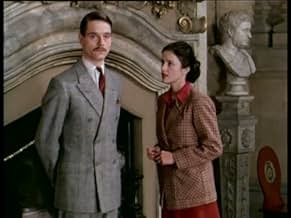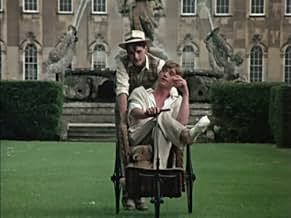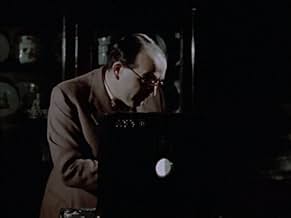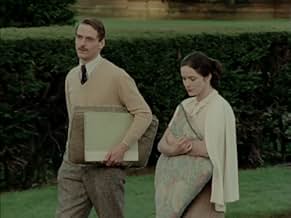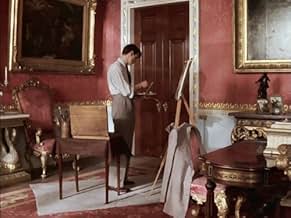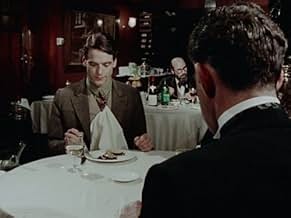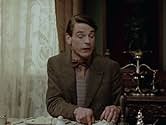IMDb रेटिंग
8.5/10
8.5 हज़ार
आपकी रेटिंग
अपनी भाषा में प्लॉट जोड़ेंThe life, friendships and romances of the protagonist Charles Ryder-including his friendship with the Flytes, a family of wealthy English Catholics who live in a palatial mansion called Brid... सभी पढ़ेंThe life, friendships and romances of the protagonist Charles Ryder-including his friendship with the Flytes, a family of wealthy English Catholics who live in a palatial mansion called Brideshead Castle.The life, friendships and romances of the protagonist Charles Ryder-including his friendship with the Flytes, a family of wealthy English Catholics who live in a palatial mansion called Brideshead Castle.
- 1 प्राइमटाइम एमी जीते
- 13 जीत और कुल 19 नामांकन
एपिसोड ब्राउज़ करें
फ़ीचर्ड समीक्षाएं
Simply enchanting. Waugh's excellent use of English in recounting the story of the doomed Marchmain family is brought to life without losing one iota of its charm and power. I doubt that anyone will be able to imagine anyone other than Anthony Andrews as Sebastian or Nikolas Grace as Anthony Blanche; Jeremy Irons gives a well-rounded performance, Diana Quick is suitably gorgeous and a host of great English actors (Gielgud, Olivier et al) lend support to a fantastic script and excellent direction. See this.
A dream cast with a magnificent script (John Mortimer) brings to life Evelyn Waugh's elegiac upon the between-wars years. Golden years and golden people are lost, and the sense of loss is captured in the changes inflicted on the buildings, and in Geoffrey Burgon's heart-wrenching score. Brideshead captures the clash of humanistic values with those of old-time Catholicism, while tracing the decline of an aristocratic (somewhat precious) family, in a series that is part comedy, part romance, part tragedy. It is an enriching experience that no-one should miss.
The book and the mini-series always broke my heart. I first read the book and viewed the series as a teenager and it affected me much more then "Catcher in the Rye".
It is probably one of the finest adaptations of a novel put to film. You watch as the reckless innocent fun of youth is slowly taken away and replaced by sad old cynicism.
It captures the feeling of the stolen season of peace between the world wars and the cool observant eye of Waugh who before hand always wrote detached speedy amoral stories. This seemed so...different.
The acting is so on the spot. Carefully restrained and woeful as we watch our favorite characters grow.
It is probably one of the finest adaptations of a novel put to film. You watch as the reckless innocent fun of youth is slowly taken away and replaced by sad old cynicism.
It captures the feeling of the stolen season of peace between the world wars and the cool observant eye of Waugh who before hand always wrote detached speedy amoral stories. This seemed so...different.
The acting is so on the spot. Carefully restrained and woeful as we watch our favorite characters grow.
The reviewers who have given positive feedback for this series have done quite well and I have little to add. Sadly, there was one review that seemed to miss the point, and I would like to address this:
"We can suppose that Lord Marchmain pretended to convert to comfort his family. There is no such excuse for Charles, who has seen the damage that Catholicism did to the whole family."
Wrong. It was the shirking of religious principle that tore apart the family. Lord Marchmain left Catholicism and thought he had license to leave his wife, so he abandoned his children to a confused, fatherless upbringing. Had he remained true to his sacramental vow to stay, "for better or for worse," by his wife's side, the family would never have been so dysfunctional.
As for the vague homo-eroticism in the first few episodes, many young men at Oxford back in the day did go through such phases and often they were in fact merely PHASES. Evelyn Waugh himself apparently did.
"We can suppose that Lord Marchmain pretended to convert to comfort his family. There is no such excuse for Charles, who has seen the damage that Catholicism did to the whole family."
Wrong. It was the shirking of religious principle that tore apart the family. Lord Marchmain left Catholicism and thought he had license to leave his wife, so he abandoned his children to a confused, fatherless upbringing. Had he remained true to his sacramental vow to stay, "for better or for worse," by his wife's side, the family would never have been so dysfunctional.
As for the vague homo-eroticism in the first few episodes, many young men at Oxford back in the day did go through such phases and often they were in fact merely PHASES. Evelyn Waugh himself apparently did.
Brilliantly adapted by John Mortimer from Evelyn Waugh's celebrated novel of England between the first and second World Wars, BRIDESHEAD REVISITED may be the best miniseries ever made. Smoothly and subtly directed by Charles Sturridge and Michael Lindsay-Hogg, the twelve hour program is beautiful to look at, the cast is remarkable, and the story has amazing impact.
The miniseries follows the novel closely, beginning near the end of World War II as Charles Ryder (Jeremy Irons) grows disdainful of military life, which he finds a study in futility--and then flashes back twenty years as Ryder recalls his relationship with the aristocratic Marchmain family, a relationship that begins when he becomes friendly with Marchmain son Sebastian Flyte (Anthony Andrews) while the two are students at Oxford.
The miniseries captures perfectly a golden moment of youth--and then the gradual disillusionment brought by the passage of time. Like all great works, BRIDESHEAD REVISITED--both book and film--touches on a great many themes, most specifically an innocent type of homoeroticism, loss of innocence, alcoholism, adultery, and changing society; ultimately, however, the story is about spiritual values and how they survive in even the most unlikely of circumstances--and how God works through individuals in the most unexpected ways.
The performances here are truly fine beyond description. Jeremy Irons has seldom surpassed his work here, and neither Anthony Andrews nor Dianna Quick (as Julia, Sebastian's sister) have ever bested their performances in this film. In addition to the three leads, the miniseries offers an incredible array of superior performances by John Gielgud, Claire Bloom, and Laurence Olivier; the cinematography and art design is flawless; and the score by Geoffrey Burgon is exquisite. Mortimer's script is remarkable in that it not only manages to recreate the novel, it also manages to capture the intangible, spiritual elements upon which the book plays but seldom directly references. A must-own work for any one who appreciates the best of the best; strongly, strongly recommended.
Gary F. Taylor, aka GFT, Amazon Reviewer
The miniseries follows the novel closely, beginning near the end of World War II as Charles Ryder (Jeremy Irons) grows disdainful of military life, which he finds a study in futility--and then flashes back twenty years as Ryder recalls his relationship with the aristocratic Marchmain family, a relationship that begins when he becomes friendly with Marchmain son Sebastian Flyte (Anthony Andrews) while the two are students at Oxford.
The miniseries captures perfectly a golden moment of youth--and then the gradual disillusionment brought by the passage of time. Like all great works, BRIDESHEAD REVISITED--both book and film--touches on a great many themes, most specifically an innocent type of homoeroticism, loss of innocence, alcoholism, adultery, and changing society; ultimately, however, the story is about spiritual values and how they survive in even the most unlikely of circumstances--and how God works through individuals in the most unexpected ways.
The performances here are truly fine beyond description. Jeremy Irons has seldom surpassed his work here, and neither Anthony Andrews nor Dianna Quick (as Julia, Sebastian's sister) have ever bested their performances in this film. In addition to the three leads, the miniseries offers an incredible array of superior performances by John Gielgud, Claire Bloom, and Laurence Olivier; the cinematography and art design is flawless; and the score by Geoffrey Burgon is exquisite. Mortimer's script is remarkable in that it not only manages to recreate the novel, it also manages to capture the intangible, spiritual elements upon which the book plays but seldom directly references. A must-own work for any one who appreciates the best of the best; strongly, strongly recommended.
Gary F. Taylor, aka GFT, Amazon Reviewer
क्या आपको पता है
- ट्रिवियाOriginally, producer Derek Granger asked Anthony Andrews to play the role of Charles Ryder. Andrews, however, felt he was better suited for the part of Sebastian Flyte. Jeremy Irons, Granger's first choice for Sebastian, preferred to play Ryder, so the two actors swapped roles.
- इसके अलावा अन्य वर्जनThe voiceover in the early Venice sequences was added for the American version after producer Derek Granger saw the initial British broadcast and felt there was not a strong enough sense of the religious feelings evoked while viewing the paintings.
- कनेक्शनFeatured in The 34th Annual Primetime Emmy Awards (1982)
टॉप पसंद
रेटिंग देने के लिए साइन-इन करें और वैयक्तिकृत सुझावों के लिए वॉचलिस्ट करें
विवरण
- रिलीज़ की तारीख़
- कंट्री ऑफ़ ओरिजिन
- भाषा
- इस रूप में भी जाना जाता है
- Wiedersehen mit Brideshead
- फ़िल्माने की जगहें
- Castle Howard, Henderskelfe, York, North Yorkshire, इंग्लैंड, यूनाइटेड किंगडम(Brideshead Castle: exterior and some interiors)
- उत्पादन कंपनी
- IMDbPro पर और कंपनी क्रेडिट देखें
इस पेज में योगदान दें
किसी बदलाव का सुझाव दें या अनुपलब्ध कॉन्टेंट जोड़ें




